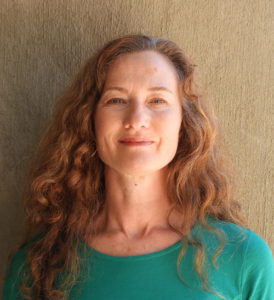
Supervising Hoffman facilitator Stella Horgan
My life’s trajectory was shaped by my upbringing in South Africa, where I was born and raised in a relatively privileged white family during apartheid.
When apartheid ended in 1994, I threw myself into a media career working on projects focused on celebrating and building the New South Africa, but by 1999 I felt a deep need to experience life in places that weren’t mired in the wounds and trauma of that legacy. I headed north to Zambia, where I met an Australian, also exploring the world.
I moved to his home in Byron Bay, only to find that I’d left the euphoria of a new democracy and landed in a beautiful, safe but laconic place. I missed the fire and passion of South Africa and felt dislocated without my career in the media. I had no steady work or financial security, and soon started sinking into depression, which gradually corroded our relationship.
One day I was discussing my situation with my neighbours, Jeanette and Volker Krohn, and they suggested doing a course called the Hoffman Process. It turned out they run the Hoffman Institute in Australia and Singapore. The course was a turning point. It cracked me open and helped me see how I operated in the world – and why that wasn’t working.
The Process revealed to me how I’d learned to behave in response to the context I grew up in – a strict nuclear family in an authoritarian country. I was rebellious, fiercely independent, tore up intimate relationships before they could take hold without knowing why, consumed far too much alcohol and too many substances, and was an intense workaholic.
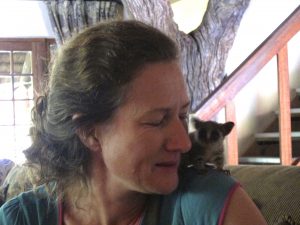
Stella and bushbaby friend
It allowed me to identify the reasons I was unable to engage my life and creativity, to get ahead and be functional. I desperately wanted to be effective, doing creative, transformational work in the world. I was doing the equivalent of pressing down hard on the accelerator while not having the vehicle in gear.
How freeing it was to realise that I could change my behaviours. On the course, I made contact with a deeper part of myself that has tremendous wisdom, integrity and kindness. I found I could be part of the world and contribute. I was VALID.
I realised that I’d been hiding my shame and feelings of failure behind defensive masks; it was an exhausting way to live. Hoffman wasn’t a quick fix, but it gave me new tools and a new language to deal with the complexities of the world.
I was so impressed by the experience that I applied to work for Hoffman. At first in an administrative capacity, then I did my apprenticeship to be a Hoffman facilitator, while concurrently studying psychotherapy at La Trobe University in Melbourne.
But as time passed, the call of my country grew more insistent. After completing a Diploma in Social Enterprise at the School for Social Entrepreneurs in Melbourne, finally, in 2012, I returned to South Africa – I wanted to contribute to my homeland. I missed the sounds, smells, the mélange of cultures, and the activism. I began by setting up the White Lion Leadership Academy at the Global White Lion Protection Trust; this was combined with activism around protecting White Lions who are highly desired in the world of trophy hunting and working with local communities living near wildlife areas. But I wanted to do more.
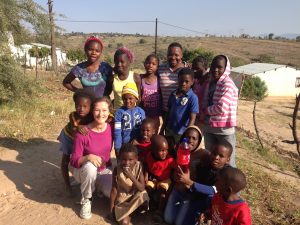
Stella with Lillian Marule and RDP Village Orphan Centre children
In 2014, I registered a Non-Profit Organisation (NPO) called Zingela Ulwazi Trust (‘Hunt for Wisdom’), to develop libraries in the Acornhoek area, adjacent to the Kruger National Park. This area is classified as a Presidential Poverty Node, with 80% unemployment, very high rates of HIV and far too many orphans and vulnerable children.
I worked with other NPOs to develop programmes, such as the Acornhoek Leadership Forum for rural leaders, and the Olifants Catchment Civil Society Support Initiative, which brought together over 150 grassroots organisations to take action on a collapsing major river system.
Today Zingela Ulwazi is running an exceptional program for rural women called Permaculture Explorers, a year-long enterprise development and permaculture gardening training program addressing hunger and extreme poverty. Our first cohort of women graduated in March 2020. We witnessed the women going through a profound transformation – they are now growing their own fresh food, and have additional income for their families. They’re radiant, confident and have greater agency in the world.
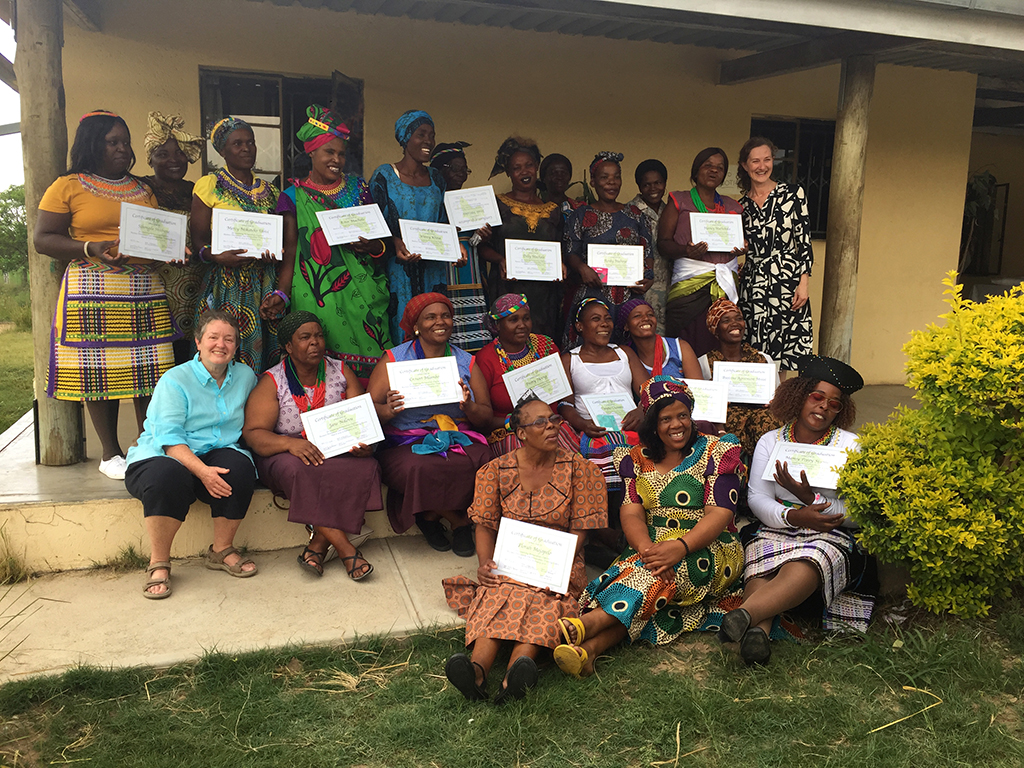
Permaculture Explorers graduation March 2020
Qualities of Conscious Leadership
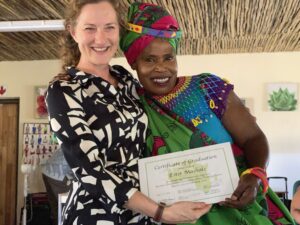
Permaculture Explorers Graduation with Ester Mashale
The most important quality in a leader is the ability to ‘know thyself’ and that’s what Hoffman allowed me to do. It connected me with my spiritual self or ‘best self’, the part of me that’s timeless and not caught up in patterns, self-image or attached to outcomes; the part of me with access to real wisdom, who can make far more enlightened choices. When the pressure is on, I can now stop and ask myself. ’Who do I want to be in this moment/situation?’
1) Innovation – It’s clear to me that the world needs a new kind of leadership. Promoting horizontality over hierarchy allows people the freedom to exercise their creativity and passion, and truly be responsible for what they’re doing in the world. The Permaculture Explorers team I work with is based on that leadership style. The levels of love, care, creativity, leadership, respect and kindness in our organisation are phenomenal, and the results of a passionate team speak for themselves in the fundamental shifts in the lives of our graduates.
2) Humility – Africa taught me to be humble. I went home in 2012 with a huge desire to help and a trunk load of ideas. I knew it would be complex, but had no idea what I’d have to navigate between race, culture and gender. Before my Hoffman education, I was attached to controlling outcomes and people. Now I’m able to step back and let my team be out front, leading the way. I have more energy and bandwidth for creativity and the things I am responsible for than if I were trying to control it. There’s so much more joy in my life.
3) Resilience – Connecting with my spiritual self gave me a reference point to anchor myself. I came away from the Process with self-confidence, self-belief, a sense of belonging in the world and the inner certainty that what I have to offer is valuable to others. It didn’t make life get magically better, but I now have the resources to meet life’s challenges, standing in my own authority and power. This also enables me in two critical aspects of leadership: being able to identify opportunities in challenges and thus find balance, and the capacity to hold and work with paradox. These skills are crucial to resilience.
4) Adaptability – Most days I use a Hoffman tool that involves checking in with all four aspects of yourself: your physical body, your emotions, your intellect and your spirit. It enables me to ground – an inner reality check, so that I can be agile in a fast-changing world. I know when to pivot and when to be still.
5) Compassion – The course enabled me be more compassionate with others through seeing that we are all affected by shame, fear and past experiences. Before Hoffman, I was compulsively critical, which makes for poor team dynamics and ridiculously high expectations. Now I have compassion for myself, which spills out to others around me. Mistakes are allowed and forgiven – mine as well as theirs.
To read more about Permaculture Explorers visit: www.zingelaulwazi.org.za
Find out more about Stella’s consultancy work and enjoy her Meditations with Nature: Africa at: www.stellahorganconsulting.com
Hoffman graduates can book one-to-one coaching with Stella (and other Hoffman facilitators) on our website here.




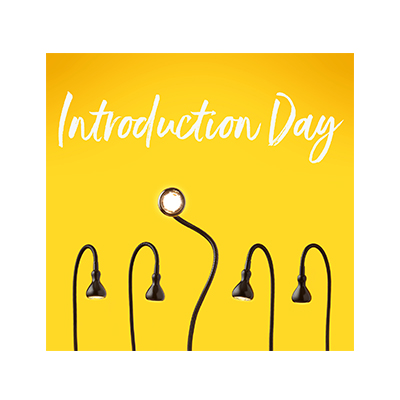

 Sign up to receive monthly newsletters from Hoffman
Sign up to receive monthly newsletters from Hoffman